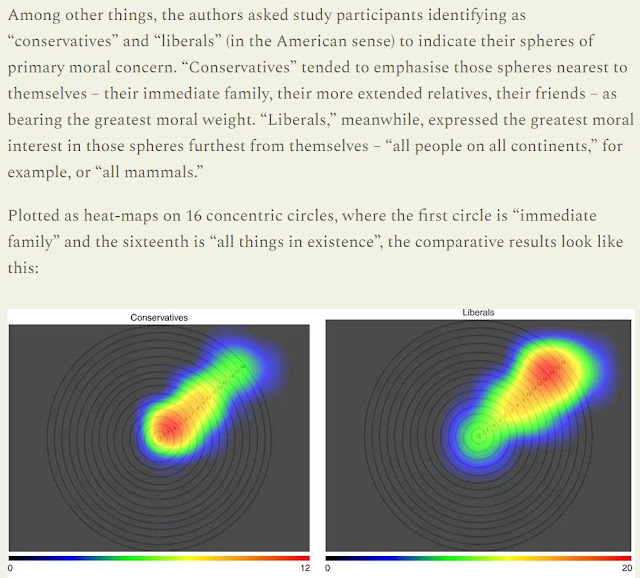Just lately, thanks to a link from D29, I have begun to see why it might be so undervalued.
The source for that data is allegedly a Nature article; maybe it's exactly right and maybe not, but I can definitely see where the impulse is coming from. Liberal (in the strict sense) morality aims to be universal rather than particular, and looks (Kant is an exemplar) to the disinterested and purely rational as a measure of avoiding prejudice for kith or kin.
One might however note that it is surprising at best to value a complete stranger, a tree, or the life on Venus (if any!) to precisely the same degree that you value your own mother. You presumably owe your mother a lot, even if she was a bad mother. You may well never cross paths with the Venusian Central Committee at all, let alone their flock. It's not only not humane, it's inhuman not to care especially about the people close to you.
In a federalist system like ours, the refusal to let the other states go their own way further increases the likelihood of conflict. We have to fight, if everywhere has to be the same and we can't all live with the same rules. We can get along, if you can go your way in Maryland and Georgia can go another way all its own. Alabama, Texas, California, Vermont, etc. If you really hate what you grew up with, you can find another way not so very far off.
Do we really want to have to fight about everything? Is that actually ethical, when it is so easily avoided? We don't have to fight with each other.
So anyway, here's another song. Pause and reflect; selah.
UPDATE: James thinks the heat map graph is overly dramatic. The data can be presented in ways that make it look less emphatic.




6 comments:
Liberal (in the strict sense) morality aims to be universal rather than particular
That part is unobjectionable--in fact, it's laudable. Either morals are universal (the still, small voice inborn) or there is no God.
Here's where it goes off the rails:
and looks (Kant is an exemplar) to the disinterested and purely rational as a measure of avoiding prejudice for kith or kin.
The theory is fine; one should apply the same moral rules to family as to anyone else. But as the 'heat map' shows, "concern" for squirrels should never overcome concern for your Mom.
"The virtues have gone mad because they have been isolated from each other and are wandering alone."
There is much on this, as on so many tempting errors, in Screwtape: The experienced devil counsels his protege to trick his patient into concentrating his goodwill and sense of duty on the most distant and abstract subjects possible. A human on the right path will start with the people he sees at the breakfast table, and gradually expand his sense of duty, charity, and fair play to more and more distant strangers, but only to the extent that he can continue doing right by those nearest him.
Vague feelings of goodwill towards remote strangers generally find no place in concrete action. It's great to embrace the sort of justice that requires us to weigh evidence as fairly for the stranger who just came to town as to the son on whom we dote and whom we're tempted to let off the hook. But there's no use treating our neighbors badly out of a determination to pretend we'd be kinder to distant strangers if only we were to come into effective contact with them some day. Being fair to your spouse or neighbors or employees is of more use than voting for a policy that sounds like it might be kind to Thai children, especially if you have no firm idea why the policy should be likely to have any such effect in the real world.
Which is not to say that we don't have a duty to vote for things like laws to protect children from genital mutilation. It should be possible to cast that ballot without forgetting to engage in basic honesty and kindness with the people we bump up against every day in real life.
"Clean your plate, kids in India are starving" put into action.
The heat map plot (Fig 5 in the paper) is a bit misleading--overdramatic. The Figures 1 and 2 display the data in ways that, while dramatic enough, let you see the level of commonality.
T99 went for the example I was thinking of, from Screwtape. Putting your generosity of spirit farther out costs you nothing but allows you to believe you are generous even to the distant and undeserving. Generosity of spirit to spouses, bosses, and neighbors can be much tougher, as there may be an actual cost.
Post a Comment